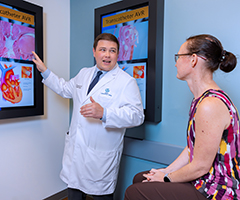Cardiology Frequently Asked Questions
General Cardiology Questions
What is a cardiologist?
A cardiologist is a medical doctor who specializes in diagnosing and treating diseases or disorders of the heart and blood vessels. They are trained in the diagnosis and management of conditions such as heart disease, heart attacks, heart failure, arrhythmias, and hypertension.
What is a cardiothoracic surgeon?
A cardiothoracic surgeon is a medical doctor who specializes in surgical procedures of the heart, lungs, esophagus, and other organs in the chest cavity. They are trained in the diagnosis, treatment, and prevention of conditions that affect the heart, lungs, and other organs in the chest.
What is the difference between a cardiologist and a cardiothoracic surgeon?
A cardiologist is a medical doctor who specializes in diagnosing and treating diseases or disorders of the heart and blood vessels. They may use non-invasive techniques such as electrocardiograms (ECGs), echocardiograms, and stress tests to evaluate the heart and its function. Cardiologists may also perform procedures such as angioplasty, stent placement, and pacemaker implantation.
A cardiothoracic surgeon is a medical doctor who specializes in surgical procedures of the heart, lungs, esophagus, and other organs in the chest cavity. They may perform both surgical and non-surgical interventions, such as coronary artery bypass grafting (CABG), open-heart surgery, lung surgery, and heart and lung transplants.
Learn more about Cardiothoracic Surgery at Lee Health
-
Cardiothoracic Surgery
Surgical care for conditions affecting the inside of the chest. Lee Health's hub for cardiothoracic care in SWFL.
-
Shipley Cardiothoracic Center
Our cutting-edge facility and award-winning surgeons manage heart and lung diseases using the latest technology, taking advantage of research trends and making a personal connection with patients.
Are cardiologists board certified?
At each stage of their training, these specialists must pass rigorous exams that test their knowledge and judgment, as well as their ability to provide superior care.
Cardiologists, pediatric cardiologists and cardiac surgeons must first become board-certified in their primary specialty (internal medicine, pediatrics and surgery respectively), and then certified in their subspecialty (cardiology, pediatric cardiology and cardiothoracic surgery respectively).
What does F.A.C.C. mean after a doctor's name?
If your cardiology specialist adds F.A.C.C. — Fellow of the American College of Cardiology — to his or her name, it is a sign of significant accomplishment and commitment to a profession, a specialty, and to the provision of the best health care for the patient.
Election to ACC membership is based on training, specialty board certification, scientific and professional accomplishments, length of active participation in a cardiovascular-related field, and peer recognition. Members are expected to conform to high moral and ethical standards.
-
Cardiology - Heart Institute at Bass Road
-
Cardiology - Heart Institute at Sanctuary
-
Cardiology - Heart Institute at Cape Coral Hospital
-
Cardiology - Heart Institute at Coconut Point
-
Cardiology - Heart Institute at Medical Plaza One
-
Cardiology - Heart Institute at Metro Parkway
-
Cardiothoracic Surgery - Heart Institute at Shipley Cardiothoracic Center
When should I be referred to a cardiologist?
Any time you have a significant heart or related condition, you may require the attention of a cardiologist. Their skills and training are required for decisions about heart catheterization, balloon angioplasty, heart surgery and other procedures.
Your cardiologist will review your medical history and perform a physical examination which may include checking your blood pressure, weight, heart, lungs and blood vessels. While some problems may be diagnosed from this examination, your cardiologist may order an ECG, x-ray or blood tests. In addition, an ambulatory ECG, echocardiogram, exercise test, heart catheterization and/or nuclear imaging may be required.
How do I know if I need a cardiac surgeon?
If your general doctor or cardiologist feels that surgery may be the best treatment for your heart condition and medication alone will not be enough, then you will be referred to a cardiac surgeon for further evaluation. The surgeon will review your medical records and tests, especially the heart catheterization results, if bypass, cardiac valve or heart surgery for a congenital defect is being considered. The cardiac surgeon will then discuss your case with you and your doctors, to give further advice about the risks and benefits of surgery.
Cardiac surgeons perform many operations in our hospitals, including - coronary artery bypass, heart rhythm surgery, valve replacement or repairs, and repairs of complex heart problems present from birth (congenital heart disease). They also are qualified to operate on organs other than the heart, such as the lungs, esophagus and blood vessels.
The Lee Health Heart Institute
The largest heart program in Southwest Florida. Learn more here about the care and services Lee Health offers.
-
Heart Institute
Start your heart care journey here. An umbrella for all of Lee Health's cutting edge cardiovascular care options.

